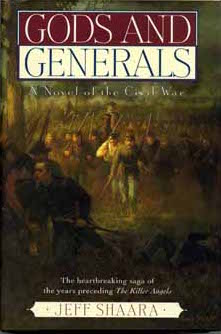The title of Michael Shaara’s Pulitzer Prize-winning Civil War novel The Killer Angels (1974) comes from an exchange between between Union Colonel Joshua Chamberlain and his father which appears relatively early in the book. Hearing Chamberlain recite a line from Hamlet that likens man to angels, his father responds, "Well, boy, if he's an angel, he's sure a murderin' angel." The title is deeply ambivalent. The ‘killer angels’ are, notably, still called angels despite being killers, and vice versa. On some level, this ambivalence is the true appeal of Shaara’s writing. He trains his sights on one of the most divisive eras in American history and refuses to allow for the presence of men and women who are either exclusively angelic or exclusively murderous, choosing instead to foreground the sheer flawed humanity that exists on each side of the conflict. The fact that he pulls off this balancing act speaks volumes.
 Michael Shaara was born in New Jersey in 1928 to Italian immigrants. Following a stint at Rutgers University, he made his way into the military (no doubt an early moment in his lifelong interest in American military conflicts). He left the army just prior to the Korean War, after which he held down a variety of odd jobs, from time spent as a police officer to a period as an amateur boxer. Even then, however, he was already beginning to publish short stories in science fiction magazines. In fact, his first story was published in 1952, just a year after his graduation from Rutgers. Before long he had published his first novel, 1968’s The Broken Place, which follows a Korean War veteran as he struggles to readjust to civilian life.
Michael Shaara was born in New Jersey in 1928 to Italian immigrants. Following a stint at Rutgers University, he made his way into the military (no doubt an early moment in his lifelong interest in American military conflicts). He left the army just prior to the Korean War, after which he held down a variety of odd jobs, from time spent as a police officer to a period as an amateur boxer. Even then, however, he was already beginning to publish short stories in science fiction magazines. In fact, his first story was published in 1952, just a year after his graduation from Rutgers. Before long he had published his first novel, 1968’s The Broken Place, which follows a Korean War veteran as he struggles to readjust to civilian life.
His follow-up, The Killer Angels, which was later adapted into the 1993 film Gettysburg, would prove to be an important milestone, not just for him but for his son. Indeed, following his father’s death, novelist Jeff Shaara would go on to write a prequel (1996's Gods and Generals) and a sequel (1998's The Last Full Measure) to his father’s acclaimed work of historical fiction.
 Though those would be his first two novels, their success catapulted Jeff to achieve accolades as a writer of historical fiction in his own right, crafting narratives like To the Last Man (2004) and Rise to Rebellion (2001), which depict the First World War and the events leading up to the American Revolution, respectively.
Though those would be his first two novels, their success catapulted Jeff to achieve accolades as a writer of historical fiction in his own right, crafting narratives like To the Last Man (2004) and Rise to Rebellion (2001), which depict the First World War and the events leading up to the American Revolution, respectively.
Jeff would, additionally, be responsible for seeing his father’s last work published. The elder Shaara had only published 3 novels in his lifetime (in addition to numerous short stories), the last of which was a science fiction novel called The Noah Conspiracy (1981), but he passed away with another completed project, For Love of the Game, yet to be shared with the world. Jeff worked to secure an agent, and after doing so, the novel was published in 1991. The book followed an aging major league pitcher before and during his final professional start, which finds him reflecting on his many years in baseball and flirting with the possibility of throwing a perfect game. This, too, would ultimately be adapted in a Hollywood picture in 1999, starring Kevin Costner as protagonist Billy Chapel.









